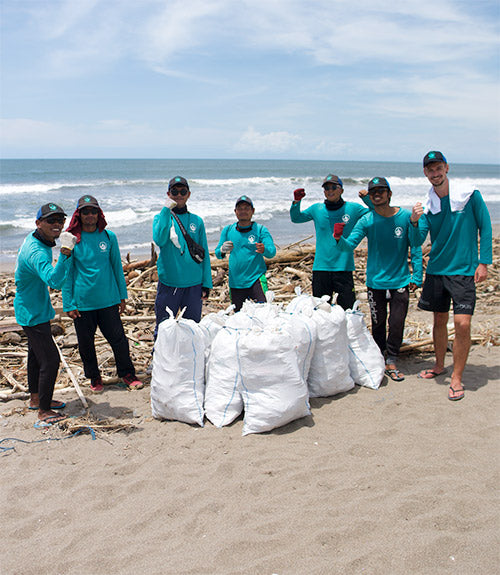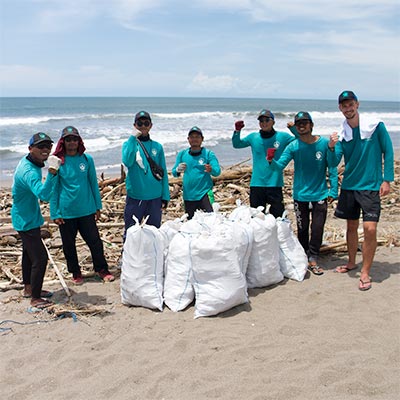For many people, this summer was or is the first big vacation in a long time. But the anticipation and the packing of suitcases are increasingly mixed with a guilty conscience. Especially against the backdrop of the pandemic and the extreme weather conditions, we are increasingly questioning our behavior and habits. And that's a good thing! Why it's important to know what travel sustainably means and how you can plan your next trip You can find out how to make it more environmentally friendly in this article!
Why is climate protection important when traveling?
The desire to travel to faraway countries, to exotic sandy beaches and extraordinary places is very great for most people, but also in tourism A rethink on the topic of sustainability is necessary. Of course, climate change cannot be stopped simply by switching to sustainable travel, but there are now numerous alternatives and sustainable options. After all, around five percent global CO 2 Emissions are attributable to tourism and this figure is expected to increase in the future if we continue as we are now.
What does sustainable travel mean?
The motto is sustainable travel. But what does this mean? sustainability on vacation and tourism actually?
In general, a process is sustainable if only as much is taken away as is returned. This means, for example, that one only cuts down as many trees as one replants. In tourism terms, this means that one fulfills one's holiday goals without causing damage to the environment or culture in the holiday destination. Instead, the chosen region should be enriched through the stay, for example, through revenue from restaurant visits. This expenditure by tourists helps the Business in the respective country and numerous Jobs can be secured. In many places, tourism is therefore a very important economic sector and promotes intercultural exchange.
How do you travel sustainably?
So, completely giving up on vacation doesn't make sense in the long run. But we can plan our trips more consciously and, for example, fly less far, avoid traveling by Avoid planes or switch to other transportation options. But there's much more to consider on your next trip. We've summarized the most important points for you here!
CO2 Minimize emissions
We all know that Long-haul flights or Cruises have high CO 2 emissions. A flight from Munich to Bali alone produces around 3,017 kg of CO 2 . For comparison: a year of driving a car produces around 2,000 kg of CO 2 . You can find out the CO 2 emissions of your flight via Atmosfair . If possible, you should avoid travelling by plane and, above all, within Europe, Train or long-distance bus However, if flying is unavoidable, for example, when traveling to a distant country, you should adjust your stay accordingly. The simple rule of thumb is: the longer the travel distance, the longer you should stay at your destination. At the same time, you can book your flight through Atmosfair or your airline. compensate and simply take the bus and train to the airport instead of driving.
Another trick is to Pack less . This saves weight, and your chosen mode of transport even uses less fuel. Furthermore, packing less luggage avoids unnecessary purchases on the spot and can save you money.
You can also make your travels at your holiday destination more sustainable by renting a bike or walking, for example.

Many destinations are also equipped with an extensive network of safe public transport equipped, so you can safely do without your own rental car. Instead of domestic flights, traveling by night train or bus is much more environmentally friendly and you'll even get a little closer to the country's culture.
Pay attention to the environmental friendliness of the accommodation
In the best case, you book your accommodation directly through a portal that has verified environmentally friendly accommodation This can be done, for example, via Good Citizen.Travel , Bookitgreen or Good Travel . Otherwise, it's already a good start if you choose a hotel that has a corresponding seal, uses green electricity, or offers vegetarian food. seal is for example GreenSign . Here you'll find numerous certified accommodations. Hostels with shared kitchens and bathrooms are also a more sustainable alternative, as communal use saves a lot of energy and water.
However, you can also make a significant contribution to a more sustainable stay by consciously using the resources available. Light and air conditioning switch off as often as possible and not unnecessarily Water waste.
In terms of sustainability, All-inclusive holidays A real nightmare. The hotel facilities, such as pool areas or golf courses, have extremely high energy and water consumption. Furthermore, guests tend to consume thoughtlessly and get used to all the luxuries, like fresh towels every day – this is definitely not sustainable. Since the hotels are mostly international chains, the local population receives only minimal support, as the jobs are often underpaid. Alternatively, you could therefore look for small, owner-managed hotels or so-called Homestays You'll be staying with a family, where you can authentically experience the local culture and support the family financially through your stay. Sounds like a fair deal!
Consume locally
Try to avoid some of your local foods in your holiday destination, as they often have to travel long distances, such as cheese in Thailand. Instead, try the local specialties and discover new dishes from all over the world!

You should also make sure to avoid large tourist restaurant chains. In small family-run restaurants or to Street stalls The food is usually not only cheaper, but tastes just as good – if not better. Furthermore, the money goes directly to the locals, so everyone benefits from your trip. You also support local vegetable farmers by visiting the weekly market - an exciting experience with lots to discover!
You can also support the people at your destination by buying souvenirs or using services such as taxis or tour guides. handmade souvenirs or guided tours with the knowledge of the locals and sometimes spend a little more money.
Respectful treatment of people and animals
Sustainable travel also includes treating the people and animals you meet or get to know on your journey. Make sure you meet locals with Treat with respect and learn at least a few words in the local language. Find out about the respective Traditions and rules of conduct. In Southeast Asia, for example, you should always take off your shoes before entering a temple or a stranger's house. Also, always ask people for permission if you want to take a picture with them; you should be especially careful with children. You don't want a picture of your child ending up on a stranger's Instagram account.
Riding elephants, petting tigers, swimming with dolphins - the animal encounters are among the most popular tourist attractions in many countries. However, this behavior often goes against the animal's nature and is only brought about by the animal being tortured or drugged beforehand. Unfortunately, the animal trade is often an important source of income, and local animal protection laws are too lax.

So what can you do? Make a big contribution against the Animal cruelty You can do this simply by supporting the respective facility or service boycott .
The same applies to Animal souvenirs , such as ivory carvings, crocodile leather purses, and coral. Importing them is often not only illegal but also harms the local wildlife. You should also import of exotic plants or sand, stones and shells from all over the world.
The general principle here is: Leave only footprints . Leave your environment as you found it. You should know the rules of conduct in local national parks, dispose of your own trash, and maybe even simply set a good example.
Environmental friendliness of your trip
Of course, there is much more you can do for the environment on your next holiday, as is generally the case with Avoiding plastic . Here you can find in our Blog article Some helpful tips for your life without plastic. Also, try to always have tickets online instead of printing them out – this also saves valuable resources. When creating your packing list, ask yourself whether you really need to buy some new items or whether you might just have to save them. lend Sometimes it might not even be necessary to fly halfway around the world and you can simply spend your hiking holiday in Slovenia instead of Nepal.
By the way: The ecological footprint of your trip you can use the calculator for the Federal Office for the Environment find out.
We're excited to see which tips you can implement on your next trip and wish you a relaxing and sustainable vacation!













